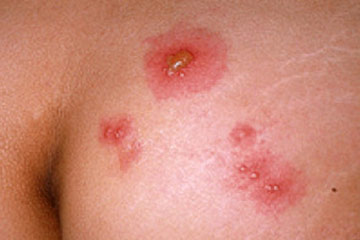You Can Prevent Toxoplasmosis (Toxo)
What is toxoplasmosis (toxo)?
Toxoplasmosis [tox-o-plaz-MO-sis], or "toxo," is a common infection among people with HIV and AIDS. It usually affects the central nervous system, including the brain. Many people infected with toxo have no symptoms. However, people with HIV or AIDS often get ill from toxo infection.
What are the symptoms of toxo related illness?
The most common symptoms of toxo-related illness are headache, confusion, and fever. Other symptoms include seizures, poor coordination, and nausea.
How is toxo spread (or transmitted)?
Toxo can be spread in two ways: 1) by eating undercooked meat; and 2) through contact with infected cat stool.
How can I protect myself from toxo infection?
- Don’t eat undercooked or raw red meat. Cook meat until its inside temperature reaches 150°F. If you don’t have a meat thermometer, cook meat until it is no longer pink in the center. Red meat is also safe from toxo if it has been frozen for at least 24 hours, smoked, or cured. Chicken, other fowl, and eggs almost never contain toxo. However, you should still cook these foods until well done because of the risk for other diseases.
- Take special care if you have a cat. You do not need to give up your cat.
- Ask someone who is not infected with HIV and is not pregnant to change the litter box daily. This will help get rid of any toxo germs before they can infect you. If you must clean the box yourself, wear gloves and wash your hands well with soap and water right after changing the litter.
- Keep your cat indoors to prevent it from hunting.
- Feed your cat only cat food or cook all meat thoroughly before giving it to your cat.
- Do not give your cat raw or undercooked meat.
- If you adopt or buy a cat, get one that is healthy and at least 1 year old. Avoid stray cats and kittens. They are more likely than other cats to be infected with toxo.
- Wash your hands well after touching raw meat and after gardening, yard work, and other outdoor activities.
- Wash all fruits and vegetables well before eating them raw.
What happens when someone with HIV has toxo infection?
When someone is infected with toxo, it hides in inactive tissue eggs (or cysts), usually in the brain or muscles. These infections stay inactive as long as the infected person’s immune system is strong. However, when HIV weakens the immune system, toxo can cause illness.
In the United States, from 15 percent to 40 percent of people with HIV infection have been infected with toxo and probably have tissue cysts. Up to half of all persons with AIDS who have toxo infection and a CD4 count under 100 get toxo-related illness.
What should I do to prevent an inactive toxo infection from becoming active?
The most important thing you can do is to get the best care you can for your HIV infection. Take your antiretroviral medicine just the way your doctor tells you to. If you get sick from your medicine, call your doctor for advice. Toxo most affects HIV-infected people whose CD4 counts are below100. If you were not tested for toxo when you were tested for HIV, ask your doctor to test you for toxo at your next appointment.
If you have toxo infection and your CD4 count falls below 100, your doctor will prescribe TMP-SMX to prevent illness. TMP-SMX is also used to prevent Pneumocystis carinii pneumonia (PCP). If you can’t take TMP-SMX, other drugs are available for toxo and PCP.
If I have had toxo-related illness, can I get it again?
Yes. If you have had toxo-related illness, you will need to take drugs for the rest of your life to prevent getting it again.
Source
Centers for Disease Control and Prevention
-
Importation of Pets and Other Animals Into the United States
-
Pet Travel
-
Pets Travel Container
-
Diseases from Dogs
-
Diseases from Cats
-
Choosing a Pocket Pet
-
Lymphocytic Choriomeningitis Virus from Pet Rodents
-
Pregnant Woman and Toxoplasmosis
-
You Can Prevent Toxoplasmosis (Toxo)
-
HIV. Preventing Infections from Pets
-
You can Prevent Cryptosporidiosis






